HP Z210 SFF Workstation: Serious Power in Cramped Quarters
by Dustin Sklavos on August 29, 2011 8:10 PM EST- Posted in
- Systems
- IT Computing
- Intel
- HP
- Xeon
- Quadro
- Workstation
- SFF
- Enterprise
- NVIDIA
Application and Futuremark Performance
Unfortunately even in the business sector we're not fully able to escape from under Futuremark's shadow, but the SSD in our review unit should give the HP Z210 SFF some breathing room, and the Sandy Bridge architecture underpinning the Xeon E3-1245 will help tremendously.
In our review of the Dell Precision T1600, their representatives took issue and rightfully so at our inclusion of benchmarks from overclocked gaming desktops in our comparison. That's one area where this review will diverge; we're including only benchmarks from non-overclocked machines. It goes a long way towards narrowing down our results, but hopefully we'll get more workstations on hand in the future and build up a solid collection of data.
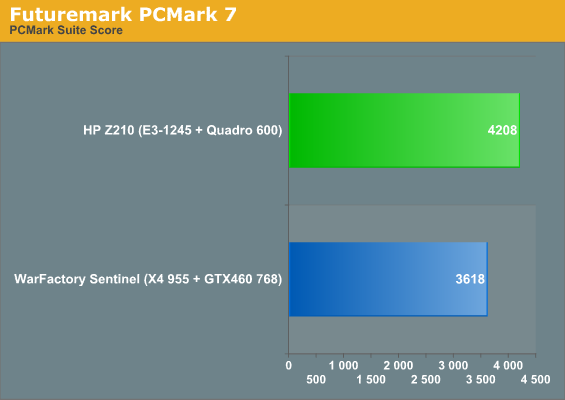
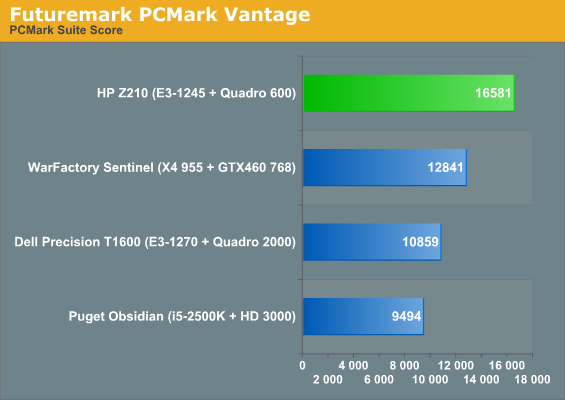
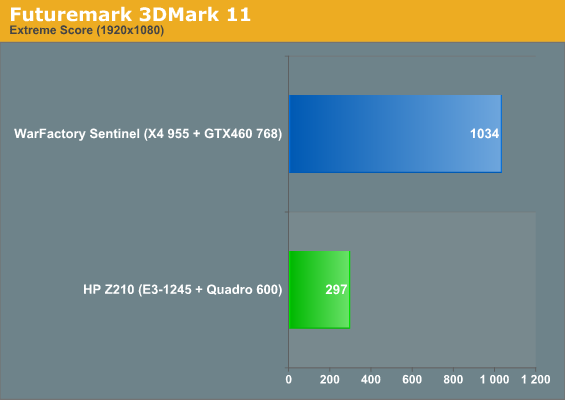
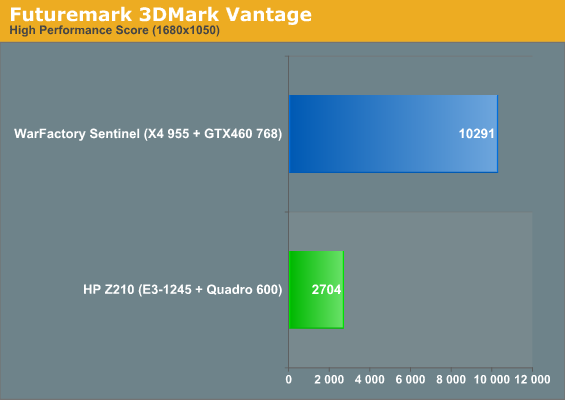
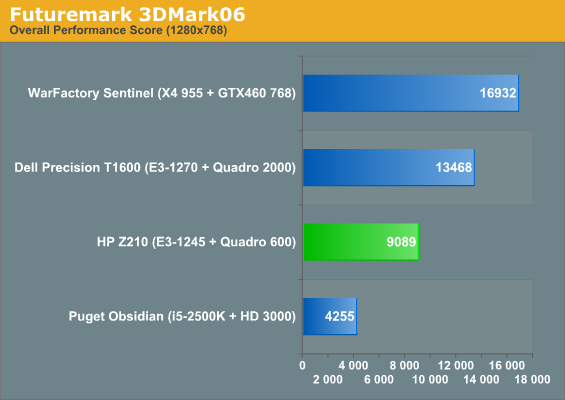
PCMark always skews heavily towards SSDs, so despite the Dell Precision T1600 having a faster processor and video card than the HP Z210, it still winds up losing in our PCMark tests. That's not really inaccurate as a representation of system usefulness, though, since the SSD will make a far more noticeable impact in overall responsiveness than a slightly higher CPU clock (unless you happen to run CPU-intensive workloads most of the time). As for the 3DMarks, we mainly use those scores to demonstrate that these aren't gaming graphics cards but do hold an appreciable performance advantage over Intel's integrated graphics.
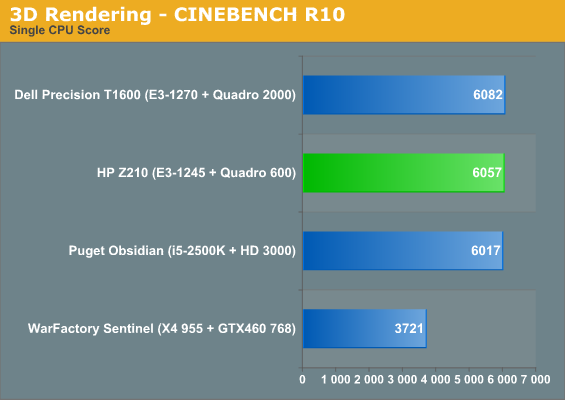
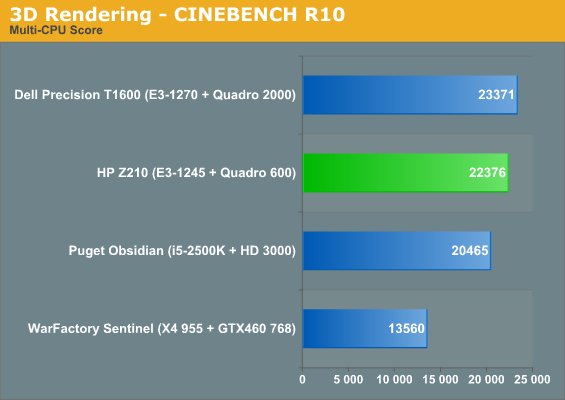
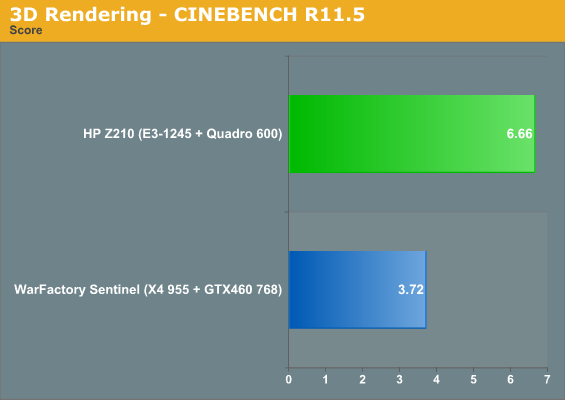
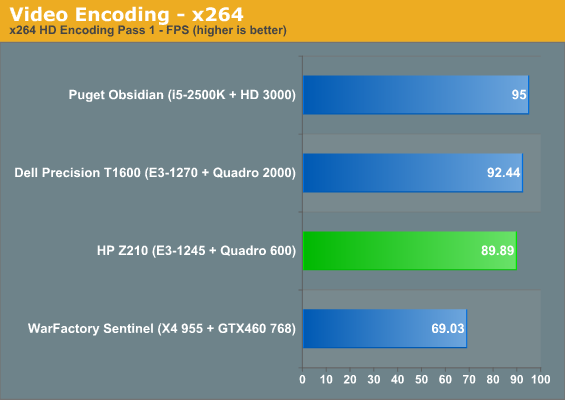
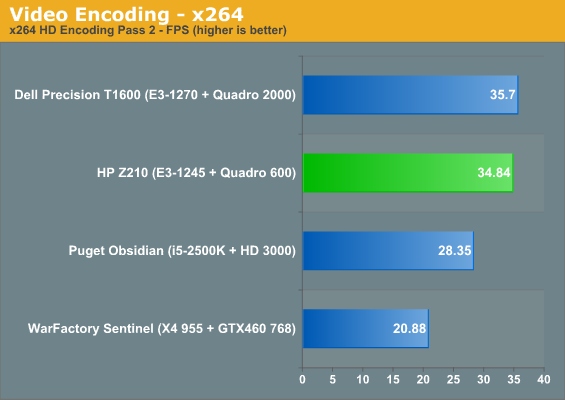
When we get to the proper application benchmarks, a couple of points immediately surface. First, the 100MHz clock speed difference between the E3-1245 and E3-1270 is wholly unremarkable. Second, the second pass on the x264 encoding benchmark sees the Core i5-2500K taking a substantial dive behind the identically-clocked Xeon E3-1245; perhaps the extra 2MB of L3 cache is paying off dividends here, or Hyper-Threading is playing a role. Third, AMD desperately needs Bulldozer. If the performance of the Phenom II X4 955 in the WarFactory Sentinel is any indication of how current Opterons are doing, AMD needs a much faster processor to get a bigger slice of that sweet, sweet enterprise market mark-up.










25 Comments
View All Comments
chuckula - Monday, August 29, 2011 - link
Well a few things, here.1. This is just one of a whole slew of HP products that have been reviewed in the last few days... but HP is abandoning the PC business... so why are we bothering again?
2. OpenGL drivers from Nvidia and AMD are both embarassingly piss-poor for consumer cards in the Windows world, and gamers don't seem to care.
3. As the article states, this machine is just a 2500K + a GeForce 430 using different server number parts. Aside from the small & ugly form factor, it's nothing you couldn't build from Newegg parts at 1/2 the price.
Dustin Sklavos - Monday, August 29, 2011 - link
1. They're backtracking on that, and until they actually DO abandon the PC business there's no reason to stop reviewing their stuff since it's out there and in force. On top of that, I'm pretty sure two units don't count as a "whole slew."2. OpenGL drivers from NVIDIA and AMD are adequate for consumer cards and gamers in Windows. Not spectacular, but Quake Wars doesn't run terribly and honestly, consumers don't run very many heavy duty OpenGL apps.
3. That's not entirely true, though. In terms of silicon, the Xeon in the Z210 SFF has some differences compared to an i5-2500K: it has Hyper-Threading, increased cache, and a locked multiplier. Likewise, the GeForce GT 430 and Quadro 600 may share silicon but they do not share OpenGL performance. So no, this is NOT something you can build from NewEgg parts at half the price.
JarredWalton - Tuesday, August 30, 2011 - link
To go with what Dustin has said, HP is looking to *sell* their consumer business off to another company, not "abandon" it entirely. Just like IBM ditched their laptops and PCs and Lenovo bought them, there would likely be a taker for the current #1 worldwide computer business.Of course, the actual silicon in the Xeon and i5-2500K might be the same, but what he means is that having the extra cache enabled along with Hyper-Threading makes a difference. You'd be better off comparing the Xeon chip to the i7-2600K, and even then there are differences (e.g. ECC).
Samus - Tuesday, August 30, 2011 - link
Ever since slowly migrating our office to HP workstaions from Dell Precision's over the past three years, I have to honestly say hardware failures are down across the board.proliance - Monday, August 29, 2011 - link
HP said they may drop the consumer line of pc's. This is a commercial product, not consumer.Taft12 - Monday, August 29, 2011 - link
... and why would any company ditch products with margins like this?! $499 laptops at Best Buy make zero profit and would not be missed.IBM sells millions of systems a year with Intel and AMD CPUs, and they "exited the PC business" several years ago. They just happen to have Xeon and Opteron branding instead of Core and Phenom.
gamoniac - Monday, August 29, 2011 - link
@chuckula,This is a commercial line product. Big corporations cannot and should not spend time building PCs with parts from NewEgg. They need the service, warranty, and reliability provided by big vendors so that they can focus on their core businesses.
So, just because you think you can build something similar to this, it does not mean this article is irrelevant to readers other than you.
@Dustin and AnandTech,
Nice article and very much worth reading. Keep up the good analysis work.
koinkoin - Tuesday, August 30, 2011 - link
Support on the hardware, onsite is important on this kind of systems.Also having proper support for your application is usefull, and this is what you end paying a bit on these kind of worksation systems.
kkwst2 - Tuesday, August 30, 2011 - link
Along those lines, my experience with both Dell and HP are that the service on the workstation-class commercial systems is excellent, whereas the service on consumer systems is, uh, wanting.I thought I hated Dell, but my T3500 workstation has been a rock and when I had some issues with adding a RAID controller, they solved my problem in 5 minutes.
And chuckula first mentions crappy OpenGL drivers in consumer grade cards, and then says the workstation-class card is just rebadged. The bottom line is they differentiate these cards by the drivers, and there is a significant difference in CAD support and optimizations for these cards. It used to be you could hack a consumer card and install the optimized firmware and drivers for it, but I think that has been largely squashed.
mike_ - Tuesday, August 30, 2011 - link
Yeah they're not abandoning it, they want to sell it off like IBM did with Lenovo. <5% margins just aren't worth the headache, and justifiably so.